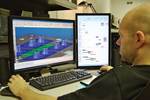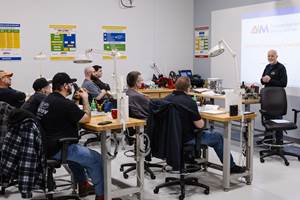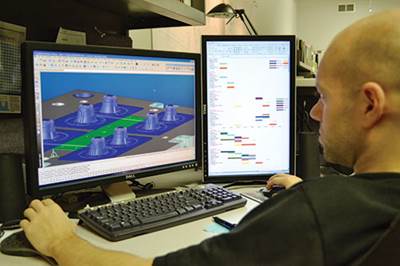PTI Engineered Plastics: One Size Does Not Fit All!
Each customer has their own unique specifications; therefore part design is never sacrificed to fit a ‘one-size-fits-all’ mold build.
PTI Engineered Plastics (Macomb, MI) has evolved from a mold manufacturer and molder in the mid-80s to a full-service provider of services like design for manufacturability (DFM), engineering, prototype and production tooling; low-volume and high-volume rapid injection molding; cleanroom injection molding and a full array of value-added services. And, the company has carved a niche out for itself with low-volume runs for its OEM customers that chose not to take their short-run production needs offshore. This unique approach separates PTI from its competition—no two molds are alike.
PTI was founded by Mark Rathbone in 1984, under the name Proto-Tech Industries as a tool builder and molder utilizing a 1,100-square foot shop. The tooling division was established to fill a need that Rathbone believed was missing: production quality prototypes that are made fast and at the same quality standards a customer would expect from a production tool. PTI's primary focus at that time was prototype manufacturing—servicing the prototype needs of the automotive, medical, aerospace and consumer product industries.
By 1987, PTI had become a builder of multiple-cavity production tools. The company then changed its name from Proto-Tech Industries to PTI Engineered Plastics to better align with the services and capabilities the company provided, Rathbone notes. The company offered a wide range of tools—both low- and high-volume in nature. By 1990, PTI had become a full-service supplier. Its business niche and focus was "prototype through production" tooling and manufacturing for components, assemblies and value added secondary operations.
Currently, the company has a 150,000-plus square foot facility, which PTI ergonomically designed to facilitate the flows and processes of its business (short-run, medium-volume moldmaking and manufacturing). PTI’s toolroom occupies 25,000 square feet and is managed and used by a team of 40 moldmakers and machinists—from apprentices to journeymen moldmakers who have been building plastic injection molds for more than 40 years. The toolroom is divided into departments, including a full design staff, moldmakers, EDM, CNC machinists, detailers and bench hands.
Low-Volume Specialty
The company’s decision to specialize in low-volume runs was driven by OEMs wishing to reshore their projects, according to Rathbone. He says although this process is offered offshore, it is difficult for OEMs to manage a product from the United States. “PTI has a unique approach to meeting the low-volume requirements of our customers,” he states. “We offer a unique, proprietary process that allows our customers to bring their product to market fast. This process, that we call P3™, provides accelerated time to market, lower overall development costs, and creates injection molded products with no compromise to the product design or material choice. This allows us to transition without issue—from prototype to supporting production—without any additional tooling requirements.”
P3 is vital to the company’s relationships with its customers, according to PTI Tooling Operations Manager Chris Behring. “This innovative approach to prototyping delivers benefits most customers are not used to in the product development process: the speed of a prototype at the quality of production.”
When a customer utilizes the P3 process, the same tool provided for testing and validation can be used for the initial production run,” Behring explains. “The tool is designed very similar to how a production tool would be. We use materials that allow us to shorten build time without compromise to quality or longevity.” Instead of merely receiving a prototype, when a PTI customer receives a P3 prototype, the same tool that provides the prototype for testing and validation can be used for the initial production run, Behring adds, and in some low-volume cases, the one tool can be used for the entire production run.
Tools made for the P3 Process are generally single-cavity molds, constructed from ferrous and nonferrous metals. These tools are capable of running tens of thousands of pieces and can produce the same volume as multiple cavity molds. Quick time to market, while maintaining quality, is an advantage of the P3 process over traditional methods.
PTI’s approach to tooling is not a "one size fits all" process. “At PTI, a typical short-run tool will be made out of the necessary materials to create quality parts,” Behring says. “This may be 100 percent aluminum, or may be a combination of aluminum, P-20, hardened steels, etc. All decisions are based on the complexity and size of the part being produced. A major factor to consider is the resin and its influence on the thermal expansion of the metals, along with the wear factors the chosen plastic may have on metals. We only use the highest grade of aluminum, QC-10 from Alcoa, allowing us to create high quality parts.”
Perfecting the Process
Behring likes to say the mold design process is the heart of PTI’s tooling facility. “We assist our customers throughout product development,” he notes. “We help to ensure that their product is manufacturable and meets their specifications. Our team of highly-skilled mold designers is experts in design for manufacturing and tool path programming—using the latest Cimatron and Mastercam software. Our main objective is to exceed customers’ expectations through mold design and the delivery of quality parts.”
PTI provides further design support through design recommendations, viable alternatives and practical assistance to assure that the customer's requested part design or model meets their specifications. “Each customer has their own unique specifications; therefore part design is never sacrificed to fit a ‘one-size-fits-all’ mold build,” Behring adds.
The company trains its employees on all of the software programs it uses and works directly with the tooling manufacturers to assure that PTI is always using the most current cutting-edge technology. “We offer in-house training, taught by the product manufacturer, designed to optimize the chip loads and cutter speeds and feeds for cutting, as well as latest advances in design software.
PTI's tooling facility utilizes a wide range of technology and equipment, Behring says. “Although our primary focus is short-run and medium-volume, we also employ the practices and disciplines used in high-volume molding,” he elaborates, “from high-speed machining to the latest in wire EDM.
EROWA holding systems and robots that have allowed us to better utilize all equipment through automation. We have found EROWA to be the most versatile system we have researched.”
Additionally, PTI has started to utilize hot sprue in lower-volume applications to ensure process development and consistencies for part quality. “Our staff is dedicated to seek out new advances in off-the-shelf technologies that will improve the timing and standardization of our mold builds,” Behring comments. “By having an internal product development team of 10 people and resources such as in-house mold flow and draft analysis; we have a significant advantage when we begin a project.”
A Bright, Busy Future
PTI’s future looks bright—and busy. The company has expanded the Southeast wing of its plant with 13,000 additional square footage. “Last year, PTI completed 723 tooling activities,” Rathbone notes. “Included in these numbers were more than 400 new tools and more than 300 engineering changes. With the expansion, our toolroom will be able to provide up to 1,000 tooling activities.”
So far this year, PTI currently has $33 million in sales, and Rathbone notes the company is on target to reach $40 million by 2014—largely due to the current facility “enabling growth” to $50 to $60 million. “Our growth plans and our unique approach to manufacturing will offer several opportunities for individuals in the engineering and the skilled trades of machining and manufacturing,” Rathbone maintains. “We are excited, and looking forward to what the future has to offer.”
For More Information
PTI Engineered Plastics / (586) 263-5100
mbrode@teampti.com / teampti.com
Related Content
The Role of Social Media in Manufacturing
Charles Daniels CFO of Wepco Plastics shares insights on the role of social media in manufacturing, how to improve the “business” side of a small mold shop and continually developing culture.
Read MoreUnique Mold Design Apprenticeship Using Untapped Resources
To help fill his mold design skills gap, Jeff Mertz of Anova Innovations, is focused on high schools and underprivileged school districts, a school that has lower graduation and college entrance rates. The goal is a student-run enterprise.
Read MoreMold Maintenance Continues to Matter: Enhanced Training Program in a New Facility
I attended a MoldTrax mold maintenance workshop in 2019 and shared my experiences, and despite changes in ownership, the workshop's remarkable value endures, as discussed in a recent Q&A with the current leadership.
Read MoreGetting You to Think in Plastic First
For this summer school basics series, Pellet to Part explores each stage of the plastic injection molding process. The final step is to take the lessons learned from this series and figure out how to impart them to the future moldmaking/molding workforce.
Read MoreRead Next
Getting to the “Core” of Buss Precision Mold’s Success
“We will continue to exhibit small company nimbleness to quickly adapt to our customers’ needs, while having the technology and capacity of a larger shop.”
Read MoreHow to Use Continuing Education to Remain Competitive in Moldmaking
Continued training helps moldmakers make tooling decisions and properly use the latest cutting tool to efficiently machine high-quality molds.
Read MoreYour Guide to Smarter, Faster Mold Design
Dive into expert-curated content delivering proven solutions for mold optimization, manufacturability and precision performance.
Read More





















